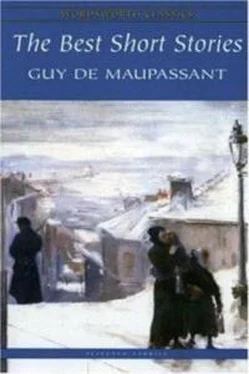Voices yelled:
"Stop him!"
Hector, frantic with terror, clung to the horse's mane and shouted:
"Help! help!"
A terrible jolt hurled him, as if shot from a gun, over his horse's ears and cast him into the arms of a policeman who was running up to stop him.
In the space of a second a furious, gesticulating, vociferating group had gathered round him. An old gentleman with a white mustache, wearing a large round decoration, seemed particularly exasperated. He repeated:
"Confound it! When a man is as awkward as all that he should remain at home and not come killing people in the streets, if he doesn't know how to handle a horse."
Four men arrived on the scene, carrying the old woman. She appeared to be dead. Her skin was like parchment, her cap on one side and she was covered with dust.
"Take her to a druggist's," ordered the old gentleman, "and let us go to the commissary of police."
Hector started on his way with a policeman on either side of him, a third was leading his horse. A crowd followed them—and suddenly the wagonette appeared in sight. His wife alighted in consternation, the servant lost her head, the children whimpered. He explained that he would soon be at home, that he had knocked a woman down and that there was not much the matter. And his family, distracted with anxiety, went on their way.
When they arrived before the commissary the explanation took place in few words. He gave his name—Hector de Gribelin, employed at the Ministry of Marine; and then they awaited news of the injured woman. A policeman who had been sent to obtain information returned, saying that she had recovered consciousness, but was complaining of frightful internal pain. She was a charwoman, sixty–five years of age, named Madame Simon.
When he heard that she was not dead Hector regained hope and promised to defray her doctor's bill. Then he hastened to the druggist's. The door way was thronged; the injured woman, huddled in an armchair, was groaning. Her arms hung at her sides, her face was drawn. Two doctors were still engaged in examining her. No bones were broken, but they feared some internal lesion.
Hector addressed her:
"Do you suffer much?"
"Oh, yes!"
"Where is the pain?"
"I feel as if my stomach were on fire."
A doctor approached.
"Are you the gentleman who caused the accident?"
"I am."
"This woman ought to be sent to a home. I know one where they would take her at six francs a day. Would you like me to send her there?"
Hector was delighted at the idea, thanked him and returned home much relieved.
His wife, dissolved in tears, was awaiting him. He reassured her.
"It's all right. This Madame Simon is better already and will be quite well in two or three days. I have sent her to a home. It's all right."
When he left his office the next day he went to inquire for Madame Simon. He found her eating rich soup with an air of great satisfaction.
"Well?" said he.
"Oh, sir," she replied, "I'm just the same. I feel sort of crushed—not a bit better."
The doctor declared they must wait and see; some complication or other might arise.
Hector waited three days, then he returned. The old woman, fresh–faced and clear–eyed, began to whine when she saw him:
"I can't move, sir; I can't move a bit. I shall be like this for the rest of my days."
A shudder passed through Hector's frame. He asked for the doctor, who merely shrugged his shoulders and said:
"What can I do? I can't tell what's wrong with her. She shrieks when they try to raise her. They can't even move her chair from one place to another without her uttering the most distressing cries. I am bound to believe what she tells me; I can't look into her inside. So long as I have no chance of seeing her walk I am not justified in supposing her to be telling lies about herself."
The old woman listened, motionless, a malicious gleam in her eyes.
A week passed, then a fortnight, then a month. Madame Simon did not leave her armchair. She ate from morning to night, grew fat, chatted gaily with the other patients and seemed to enjoy her immobility as if it were the rest to which she was entitled after fifty years of going up and down stairs, of turning mattresses, of carrying coal from one story to another, of sweeping and dusting.
Hector, at his wits' end, came to see her every day. Every day he found her calm and serene, declaring:
"I can't move, sir; I shall never be able to move again."
Every evening Madame de Gribelin, devoured with anxiety, said:
"How is Madame Simon?"
And every time he replied with a resignation born of despair:
"Just the same; no change whatever."
They dismissed the servant, whose wages they could no longer afford. They economized more rigidly than ever. The whole of the extra pay had been swallowed up.
Then Hector summoned four noted doctors, who met in consultation over the old woman. She let them examine her, feel her, sound her, watching them the while with a cunning eye.
"We must make her walk," said one.
"But, sirs, I can't!" she cried. "I can't move!"
Then they took hold of her, raised her and dragged her a short distance, but she slipped from their grasp and fell to the floor, groaning and giving vent to such heartrending cries that they carried her back to her seat with infinite care and precaution.
They pronounced a guarded opinion—agreeing, however, that work was an impossibility to her.
And when Hector brought this news to his wife she sank on a chair, murmuring:
"It would be better to bring her here; it would cost us less."
He started in amazement.
"Here? In our own house? How can you think of such a thing?"
But she, resigned now to anything, replied with tears in her eyes:
"But what can we do, my love? It's not my fault!"
Useless Beauty
I
About half–past five one afternoon at the end of June when the sun was shining warm and bright into the large courtyard, a very elegant victoria with two beautiful black horses drew up in front of the mansion.
The Comtesse de Mascaret came down the steps just as her husband, who was coming home, appeared in the carriage entrance. He stopped for a few moments to look at his wife and turned rather pale. The countess was very beautiful, graceful and distinguished looking, with her long oval face, her complexion like yellow ivory, her large gray eyes and her black hair; and she got into her carriage without looking at him, without even seeming to have noticed him, with such a particularly high–bred air, that the furious jealousy by which he had been devoured for so long again gnawed at his heart. He went up to her and said: "You are going for a drive?"
She merely replied disdainfully: "You see I am!"
"In the Bois de Boulogne?"
"Most probably."
"May I come with you?"
"The carriage belongs to you."
Without being surprised at the tone in which she answered him, he got in and sat down by his wife's side and said: "Bois de Boulogne." The footman jumped up beside the coachman, and the horses as usual pranced and tossed their heads until they were in the street. Husband and wife sat side by side without speaking. He was thinking how to begin a conversation, but she maintained such an obstinately hard look that he did not venture to make the attempt. At last, however, he cunningly, accidentally as it were, touched the countess' gloved hand with his own, but she drew her arm away with a movement which was so expressive of disgust that he remained thoughtful, in spite of his usual authoritative and despotic character, and he said: "Gabrielle!"
"What do you want?"
"I think you are looking adorable."
She did not reply, but remained lying back in the carriage, looking like an irritated queen. By that time they were driving up the Champs Elysees, toward the Arc de Triomphe. That immense monument, at the end of the long avenue, raised its colossal arch against the red sky and the sun seemed to be descending on it, showering fiery dust on it from the sky.
Читать дальше












